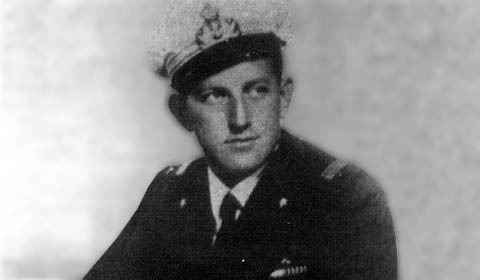Enemy Gives Medal for Ship Sinking June 17, 2015
Author: Beach Combing | in : Contemporary , trackbackThere are very occasional instances of enemy officials reporting on the gallantry and heroism of opposite numbers. Captain Roope of the HMS Glowworm was, for example, given his Victoria cross in part because of the testimony of a German captain, Heye, whose ship had been rammed by Roope in 1940. However, there is one instance of a sailor being given a medal by an enemy for an attack on the enemy’s country, which is something that goes far beyond simple chivalry: drbeachcombing AT yahoo DOT com for any others on record… In March 1945* a British Admiral Charles Morgan, who was commander of the occupied Italian port of Taranto, accompanied the Italian crown prince Umberto to give medals to Italian servicemen, who were now serving the royal cause. One of these medals, the Gold Medal for Valour, was for a Lieutenant de la Penne. When Umberto and Morgan reached de la Penne, the prince turned to the Admiral with the words: ‘Come on, Morgan, this is your show!’ and had the Briton pin the medal to the Italian’s chest. To his very great credit, Morgan did so, even though the medal was being given for de la Penne’s sinking of Morgan’s boat some three years before.
De la Penne was a brilliant Italian officer who had served in 1940 and 1941 with mini Italian submarines. These maiali or ‘pigs’ would power two riders into British-controlled harbours and then the riders would go and attach explosives to the bases of ships: Italy scored several conspicuous successes with these sea chariots. His last attack for Fascist Italy and his most successful came 19 December 1941 when three Italian pigs were launched into Alexandria bay. De la Penne and his second Emilio Bianchi attached explosives to the British warship, the Valiant, but were then noticed by sentries and dragged onto the ship: the explosives had not been properly placed but the Italian still hoped for a big ban. They were imprisoned on board the ship close to where the charge had been laid and De la Penne was taken to the Captain, one Charles Morgan (Morgan would only be promoted to rear-admiral in 1942) to warn him to save his crew: it was too late to save his ship. Morgan demanded that De la Penne tell him where the explosive charge was. De la Penne refused and so Morgan gathered all his men on the mid parts of the deck and sent De la Penne and Bianchi back down to the cabin where he had been imprisoned. His door was happily left unlocked…
De la Penne and Bianchi got up to the top of the ship when the blast actually went off with just a small injury to De la Penne’s knee: Bianchi had been slightly hurt in laying the explosives. They had the thrill of seeing the bombs going off under three other ships including the Queen Elizabeth. All six Italian servicemen who had taken part in the attack were captured and sent to India to POW camps there. De la Penne returned in 1943 to fight for Allied Italy (he became, to give some idea of his loyalties, a Christian Democrat after the war) and even undertook a raid on la Spezia (then under German/RSI control). Operating out of Taranto he had come to know Morgan well and they had often talked about their brief past acquaintance: Morgan had recommended De la Penne for a medal for the la Spezia attack. As it was he would end up giving a medal for an attack on a British ship, his own to boot: the medal giving had only been possible after repatriation.
*I’ve failed to find the exact date in March. Not May as in many sources.
18 June 2015: Hopalong writes. I found this comment online but have been unable to substantiate either. The watch story reminds me of De Valera’s binocs, let’s hope it is true. ‘Morgan not only gave him the medal but also returned his watch, taken when he was captured. As it was a Panerai – made by Rolex – I dare say he was very pleased to get it back. What is very interesting is that while de la Penne and the others were POWs, Winston Churchill, who had described their attack as having been carried out with great courage and ingenuity, demanded reassurance that they were not being harshly treated in their prison camps. Of the six, five went on to help the Allies who had established their own ‘human torpedo’ programme.’



